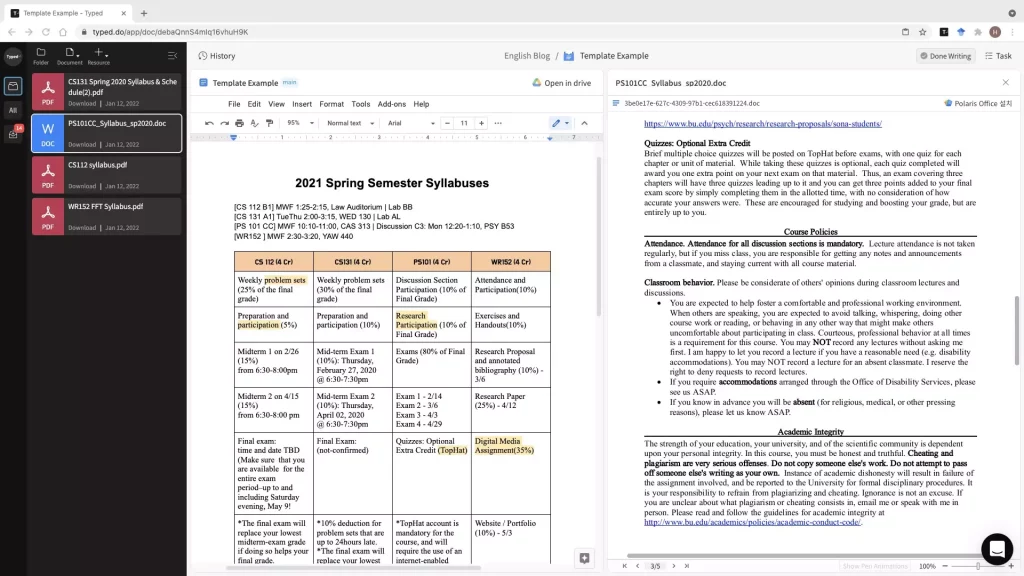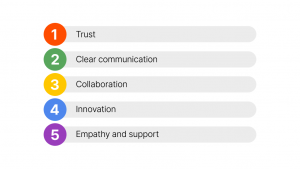College life is totally different from that of high school. You’re living apart from your parents and no one is waiting to tell you what you must do. Having all your tasks under control is quite difficult and managing them properly is even more demanding. Moreover, as coronavirus has invited us to the era of remote classes, it’s become harder for students to keep everything on track. Don’t worry, I’m not here to scare you off. In this post, I’ll introduce four effective ways to improve your productivity throughout the whole semester by keeping yourself organized.
*Spoiler Alert: Divide and Conquer!
Let’s begin with the first week of semester. Most of you take 4 to 5 courses per semester, and each of them usually consists of 2 to 3 midterms as well as final. Furthermore, there are small exercises and homework assignments that you need to take care of. If you miss the first week, it’s much easier to miss a whole semester. To avoid that, you must be aware of your semester schedule before you start. Organizing each course’s information is crucial to keep on track throughout the semester. Then you must ask a question: how? Well, sometimes it’s easier to show than it’s to tell.

Using Typed, a one-stop document software maximizing knowledge management, I make a schedule table for each semester. This table above entails every information on course syllabuses: weekly problem sets, reading assignments, midterms, quizzes, and finals.
Remember: important strategy here is to divide and conquer. Once you grasp the extensive timelines for a whole semester, you’ll be able to figure out how to keep on track at your pace.
Exams: Organize Course Materials
Now that you have all schedules in one hand, you can say you know what to do. It’s time to enhance productivity by knowing how you do it. Since each midterm covers too much information to digest at once, It’s crucial to summarize it everyday. (Again, Divide-and-Conquer!) One good way to do this is note-taking, and a better way is online note-taking.
- Download course materials-such as slides or PDFs- and bring them to your class.
- Write down what professor highlights yet materials don’t cover.
- Keep all materials in one place and boil them down to a single sheet of paper.
- Before an exam, review them while checking original notes for details.
For step 3 and 4, Typed could be the best place where you can collect all materials, write a summary paper, and keep them together. Typed lets you attach resources, such as URL links and any files including PDFs, to your document so that you can check your resources and the document you write in a well-made split view.
Papers: Organize Research Process with Writing Tools
Whether or not you’re a liberal arts major, writing courses and liberal arts courses requiring you to write papers are often mandatory for graduation. One way to get a good grade from a writing assignment is, again, organization. Organizing the process of your writing is often helpful for you to keep focused on the contents of your paper. Common steps to write a paper are research, outline, draft and revision.
- Research is the root of your paper. Your resources must be reliable, relevant, and persuasive. Since plagiarism is a serious problem in the academic field, you must know exactly where you’ve collected your resources make correct citations. Considering effective writing tools to save your time could be one way to make this step easier.
- Now it’s time to create your own voice. Outline is the stem of your paper, and a thesis statement is in its core. Since the outline decides overall quality of your paper, you need to make it as specific and compelling as possible.
- Once the root and the stem grow, it’s time for the tree to bear fruits! You really need to focus on writing and keep track of what you’re writing to make your fruit bigger and sweeter.
Finals: Backtrack What You’ve Already Organized
You’ve done a lot. You’ve handled all the exams, papers, discussions and quizzes. All you have to do now is finals. In this phase, what you’ve collected and organized throughout the semester become essential. Many finals are cumulative or depending on the papers you’ve already written. This is why you might want to keep every assignment and exam organized until the end of the semester. Since many of course materials are correlated, you might want a new way to effectively organize your files that shows links and similarities rather than a mere hierarchy. Backtracking what you’ve studied for 4 months, you would feel proud as well as ready for the finals.
Organization: Divide and Conquer
If you ask me to select one takeaway you should remember, it must be ‘divide and conquer’. Although college coursework looks too heavy and you might be overwhelmed at a first glance, you will eventually finish if you do it one by one. Organize what you must do, divide it into small tasks you can tackle, and conquer it wonderfully.
Good Luck for your semester!



